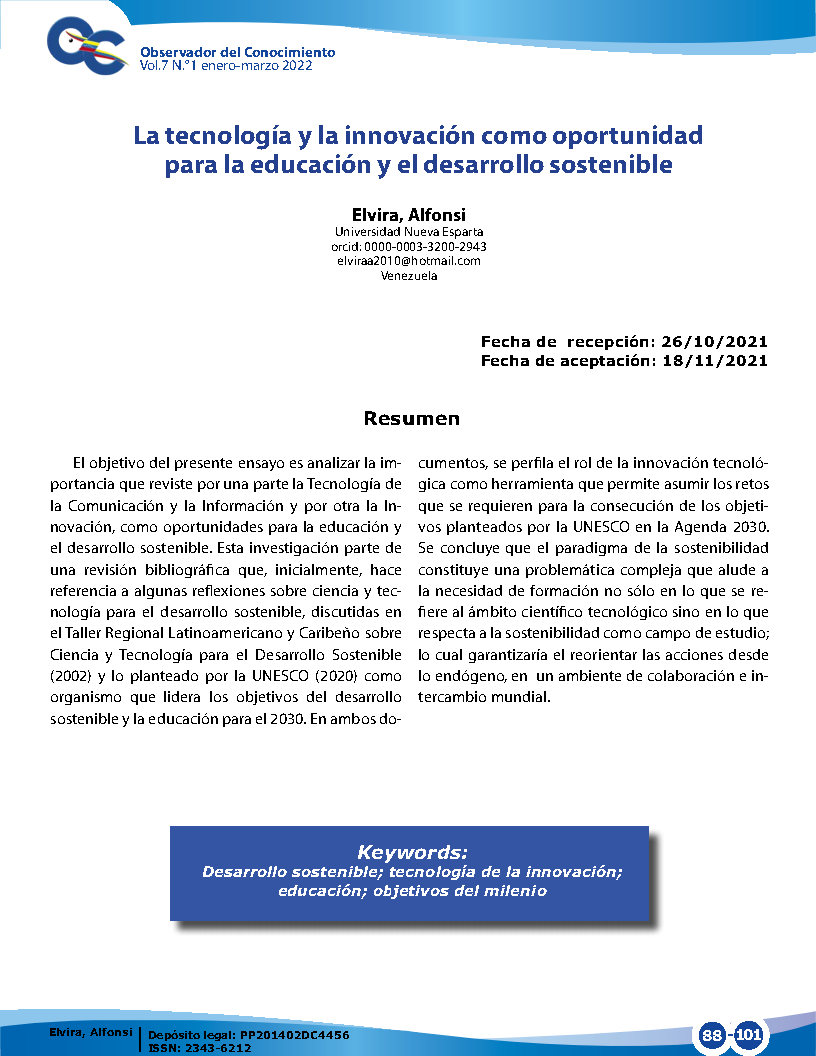Echnology and innovation as an opportunity for education and sustainable development
Keywords:
Sustainable development, innovation technology, educationAbstract
The aim of this study is to develop the theme of innovation and educational technology. As an opportunity for sustainable environmental development. Based on a bibliographic review referred to some reflections on science and technology for sustainable development. Previously assessed at the Latin American and Caribbean regional workshop on science and technology for sustainable development (2002). Based on the opportunities and challenges that these terms entail for sustainability in the above regions and other educational and sustainability considerations. As tools for training, from which ideas and practices are generated, to achieve global objectives for the sustainable development of nations on The Agenda 2030. After referring to the aspects of the model of sustainable development from the Latin American perspective, a brief description was made from a European perspective, concluding that the sustainability paradigm is a complex problem that refers to the need to reform scientific and technological capability of the regions, and reorient actions from the endogenous, in a global partnership and exchange environment.
Downloads
References
Cárdenas, A. (2015). Tecnología para el desarrollo sostenible. Recuperado en: https://secmotic.com/tecnologia-parael-desarrollo-sostenible
CEPAL (2018). La tecnología y la innovación son fundamentales para la implementación de la Agenda 2030 en América Latina y el Caribe. Recuperado en : https://www.cepal.org/es/ comunicados/la-tecnologiala-innovacion-son-fundamentales-la-implementacionla-agenda-2030-america
CEPAL (2003). Ciencia y tecnología para el desarrollo sostenible. Recuperado en: https://repositorio.cepal.org/bitstream/ handle/11362/6538/1/S0316_ es.pdf
Eco e m b e s ,(2021). L a Transformación Digital Aliada de la Sostenibilidad. Recuperado en: https:// ecoembesempleo.es/la-transformacion-digital-aliada-dela-sostenibilidad/
ONU (1972). Conferencia de las Naciones Unidas sobre el Medio Ambiente Humano. La Declaración de Estocolmo. Recuperado en: http://ordenjuridico.gob.mx/TratInt/Derechos%20Humanos/ INST%2005.pdf
ONU (1982). El informe Brundtland. Recuperado en: https://www. cambioclimatico.org/contenido/el-informe-brundtlandnuestro-futuro-en-comun
UNESCO (2020). ¿Qué es la Educación para el Desarrollo Sostenible?. Recuperado en: https://es.unesco.org/themes/ educacion-desarrollo-sostenible/comprender-EDS
UNESCO. (2018). Uno de cada cinco niños, adolescentes o jóvenes del mundo no está escolarizado. Recuperado en: https://es.unesco.org/news/ cada-cinco-ninos-adolescentes-o-jovenes-del-mundono-esta-escolarizado
UNESCO (2015). Educación 2030 Declaración de Incheon: Hacia una educación inclusiva, equitativa y de calidad y un aprendizaje. Recuperado en: https://www.gcedclearinghouse.org/sites/default/files/ resources/245656s.pdf
UNESCO (2006). Decenio de las Naciones Unidas de la Educación con miras al Desarrollo Sostenible (2005-2014) : Plan de aplicación internacional 2006. Recuperado en: https://unesdoc.unesco.org/ark:/48223/pf0000148654_ spa
PNUD (2018). Ensayos sobre desarrollo sostenible. La dimensión económica de la Agenda 2030 en la Argentina – Buenos Aires: PNUD. Recuperado en: https://www.bing.com/search ?q=ensayos+sobre+el+desar rollo+sostenible&cvid=17db8 401c5cf4c528390e8094de46 2a1&aqs=edge..69i57.15989j0j 4&FORM=ANAB01&PC=U531
Sousa, A. y Uceda-Maza, F., (2017). Más allá de los desafíos del decenio de la educación para el desarrollo sostenible: una reflexión necesaria. Recuperado en: https://www.redalyc.org/ pdf/4815/481554850012.pdf
Smith, A. (2003). Tecnología y Desarrollo Sustentable. Una Perspectiva Europea. Recuperado en: https:// w w w.redalyc .org/ pdf/124/12499401.pdf

Downloads
Published
How to Cite
Issue
Section
License
Copyright (c) 2022 http://creativecommons.org/licenses/by-nc-nd/4.0/

This work is licensed under a Creative Commons Attribution-NoDerivatives 4.0 International License.







